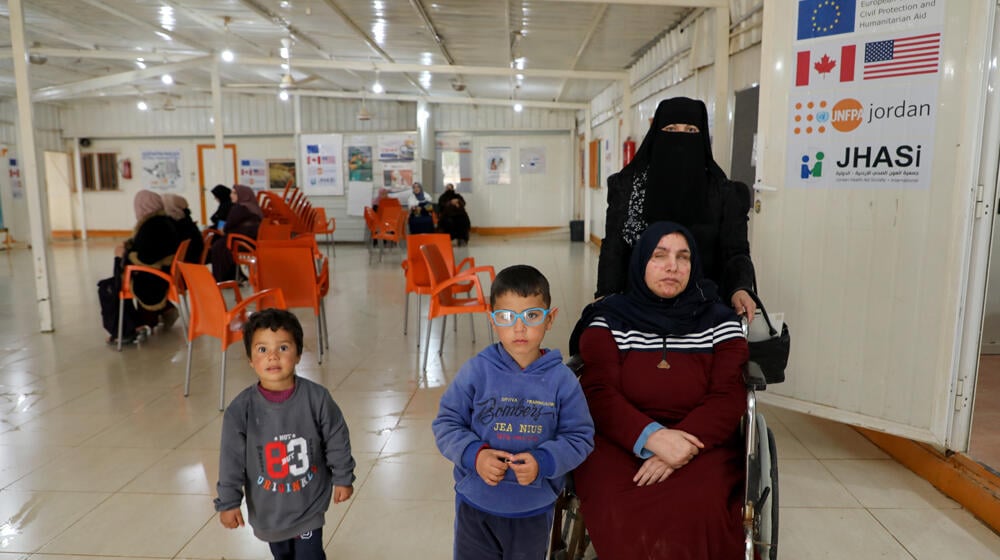Last month, Fida, a 45-year-old Syrian refugee and mother of seven daughters, began to bleed unexpectedly. She had a miscarriage, the second such loss in just eight months.
Describing her scare, she recounted, “I suddenly started bleeding. At first, I thought it was my period, but my daughter quickly called for an ambulance,” she said, while seated in a wheelchair at the Zaatari camp's UNFPA-supported Sexual and Reproductive Healthcare (SRH) clinic.
“The doctor told me to take three pills, reassuring me I would feel better. The bleeding stopped after I took them.”
Fida, who has been living in Zaatari camp since January 2013, has been a regular at the SRH clinic at Zaatari camp, home to 78,000 Syrian refugees.
Her medical care involves more than just emergency help. It also includes ointments, suppositories, and anti-inflammatory drugs to meet her various health needs.
Diagnosed with Behçet's syndrome at the age of 20, Fida has since lost her eyesight and continues to experience debilitating joint pains. To compound her struggles, a fall from the second floor after her diagnosis resulted in a broken hip, further limiting her mobility and confined her to a wheelchair. This combination of health issues made her susceptible to recurrent infections notably in her genital area, including urinary tract infections. (The use of contraceptives increases the risk of blood clotting.)
I have repeated infections and the doctors really take good care of me here. As soon as I arrive to the clinic, they bring me straight in because of my condition so I don't have to wait. The medications are always available, and so is the help. The doctors tell me, 'Anytime you're feeling unwell, you just come right back.
Since its inception in 2013, The SRH clinic services in Zaatari camp have been vital for Fida and many other refugee women like her.
It provides a wide range of reproductive health services ranging from antenatal and postnatal care to emergency obstetric care, including referrals to C-sections, alongside family planning, treatment for sexually transmitted diseases, post-abortion care, urinary tract infection treatment and laboratory testing.
In total, the UNFPA- supported clinic offers an average of 72,000 diverse services to Syrian refugees each year. Yet, this high demand faces challenges as funding shortages forced some clinics to close at the camp and over overextended the remaining services.
Yet for Fida, the health services in the camp are not only a crucial support in her daily battle for survival but also provide her with much-needed relief amidst her ongoing challenges.
Her husband, who is incapacitated by knee pain, is unable to work. They are indebted to a small grocery store near their prefabricated caravan, where she lives with him and their two youngest daughters, aged five and three. They rely on monthly assistance of 15 Jordanian Dinars (approximately $21) each for their food needs, an amount that barely covers their necessities.
Occasionally, their sons-in-law pitch in to help cover their expenses. (Her five other daughters are married).
“My joints hurt badly, and I stopped taking pain killers because they make it difficult for me to sleep,” she said. She crawls to reach the bathroom and is able to use it independently.
“There is no one who cooks at home, so people around who cook feed us especially now in Ramadan,” she said.
“Having the health services for us and the children is the most important thing,” she said. “Without them, I would have to seek doctors outside the camp. We cannot afford it.”
Daily, the UNFPA-supported clinic caters to an average of 100 to 150 patients in Zaatari camp, the vast majority of whom are pregnant women.
A doctor is available round the clock specifically for deliveries and emergencies, ensuring that pregnant women have access to immediate medical attention at any time. The clinic is also staffed with two obstetricians and a pediatrician.
Part of its mission also involves raising awareness on family planning and the health risks associated with early marriages.
“We harness our resources to deliver the best possible care, Lamia Aldbisi, manager at JHASi, said.
Aldbisi's compassion for her work is evident in her understanding of the camp population's health needs and vulnerabilities.
“We focus on primary healthcare, and at the same time we're deeply aware of the vulnerabilities our patients face including their psychological well-being and health,” she added.
At the clinic, the medical care Fida receives goes beyond treating her physical ailments.
“I truly feel like they are looking out for me,” Fida said. “It makes me feel seen, like I'm a person who matters. It's a comfort to know there are people who care about me. It makes me feel like I matter in society like a normal person.”
EU Humanitarian Aid is the kind donor that supports the Reproductive Health Clinic as well as the Women & Girls Safe Space in Zaatari Camp.


